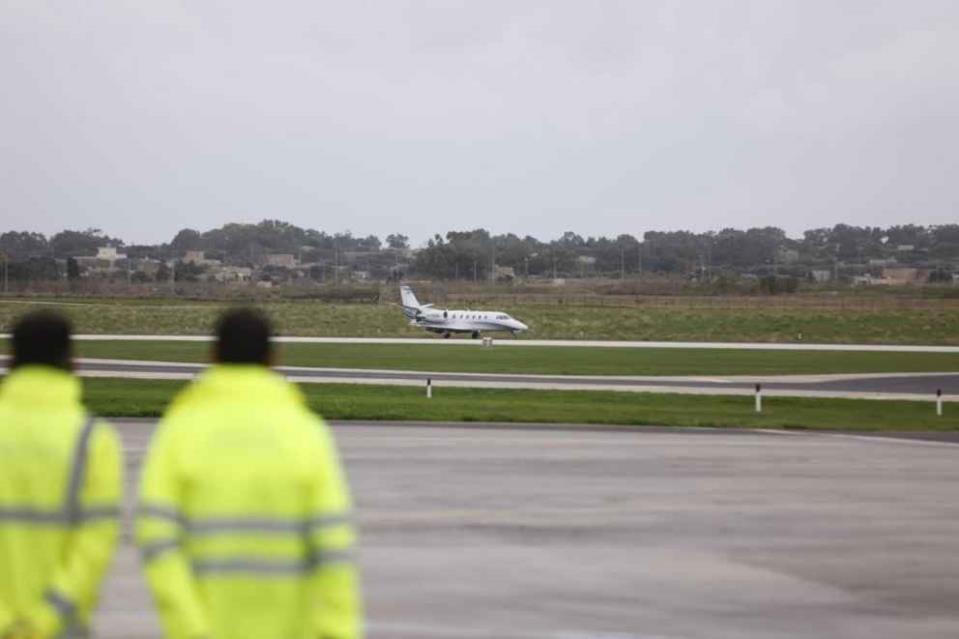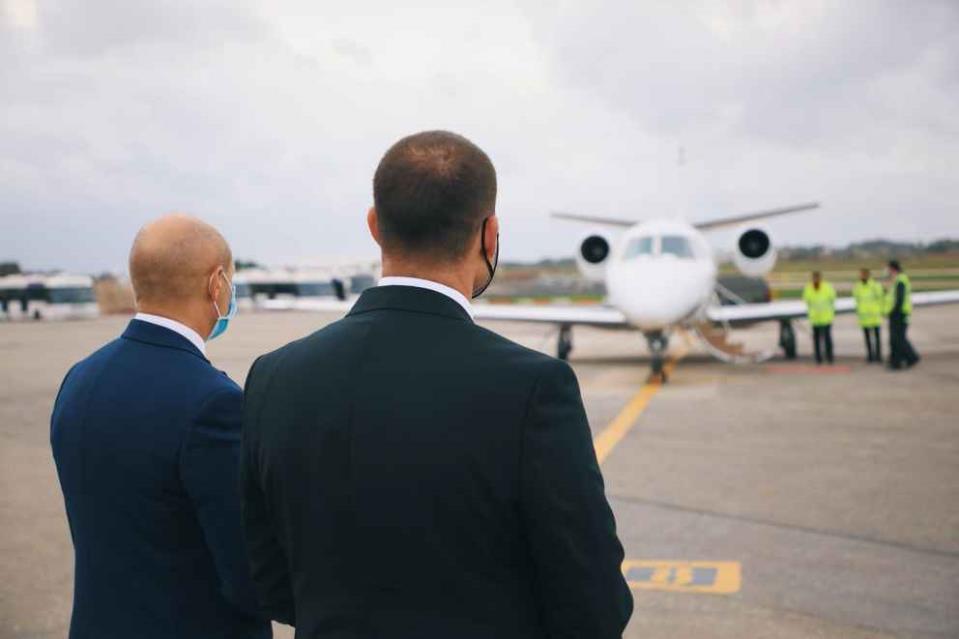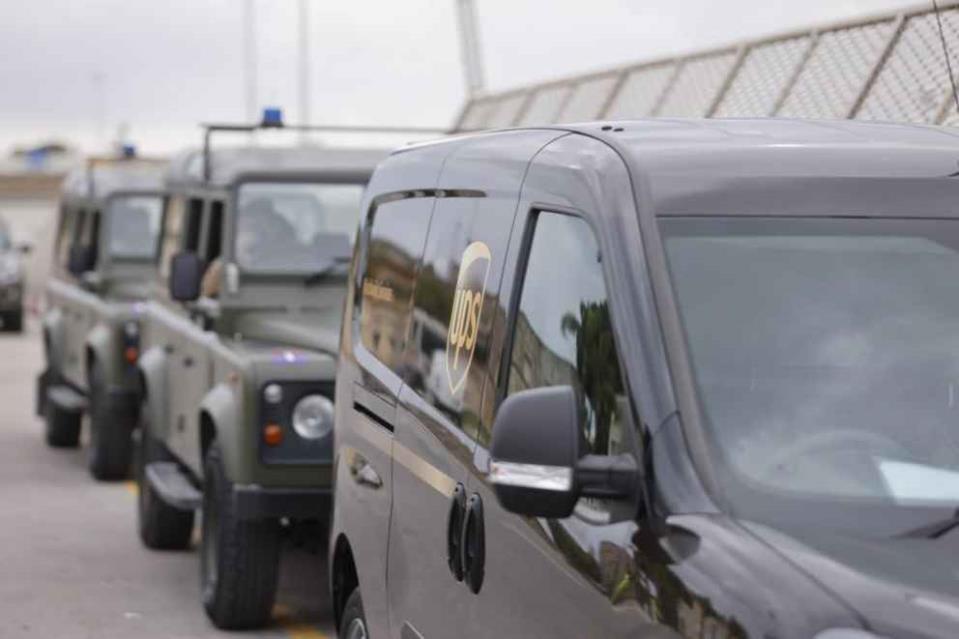The first batch of 10,000 Covid-19 vaccine doses arrived in Malta on Saturday morning, in what was desribed by Prime Minister Robert Abela and Health Minister Chris Fearne as a "historic" day that will start taking the country back to normality.
The vaccine will start being distributed on Sunday.
The first doses, manufactured by pharma giant Pfizer, arrived on board a private jet that landed at Malta International Airport at around 10.40am.
The medical cargo arrived under strict security. A rigorous process has to be followed to keep the vials stable and at a certain temperature.

Addressing a press conference, the Prime Minister said we can finally look forward to a return to normality. “This day brings hope and courage. We are here because we were united and worked together for a single aim. I am proud of the decision we took to use all resources to protect lives and livelihoods.”
The government ensured that Malta had the equipment and resources needed for the pandemic not to overcome us, he said. “This was the best investment we could have made,” he said, outlining the different measures introduced over the past months.
“We introduced the wage supplement, the vouchers, the moratoria on loans and assistance on energy bills. We kept unemployment low and property sales remained strong. We kept schools open with an investment of €30 million. Another round of vouchers is on the way. We were among the first countries to receive the vaccine. Active cases are going down and we avoided a lockdown.”
The vaccine will give hope to our elderly and vulnerable, who suffered greatly over the past months, Abela said. “Soon, they will be able to spend time with their loved ones again.
The vaccine also gives peace of mind to our businesses. "We can now look beyond the pandemic."

"We will start the road to normality from pole position. We need to remain vigilant and keep observing the rules. The road to normality starts today.”
Abela warned people, however, not to let their guard down too soon. "That would be a mistake and could endanger the efforts we made over the past months.”
An emotional Chris Fearne said that, “so far we have been defending against the virus, but now we can start attacking. This is a historic day on which we can reclaim our lives.”
Culture and commerce can start going back to normal.
“Covid-19 touched some 80 million people worldwide and killed around 2 million. A number of people have died in Malta and our thoughts today are with them.”
A moment of silence was observed as a sign of respect towards those who have lost their lives.
“The virus disrupted many aspects of our lives, but we now have the tools to fight back.” Malta is among the first countries in the world to receive the vaccine, he continued.

In a few weeks’ time, 20,000 people will be vaccinated every week, and the entire population will have received the vaccine by summer.
“We will work on a vaccine passport so that people who have had received the vaccine by then will be able to travel freely.” Those who receive the vaccine will be given a vaccination certificate.
Fearne urged people to show solidarity by following the regulations. “We have done half a million swab tests so far, which is equal to the number of people living in Malta. We are the only country to have done that. Tomorrow, we turn a new page.”
Health Superintendent Charmaine Gauci said Malta has so far focused on prevention in order to keep the number of cases stable and manageable. Prevention and vaccination now have to move in parallel until the entire population has been vaccinated. “Only then can we say that we have controlled the virus.”
People should understand how important the vaccine is. “When you are called to get vaccinated, do so, for yourselves and for those around you.”
Gauci said there might be an increase in new cases over the coming weeks, but the numbers will go down again.

Asked about people who are unsure whether to take the vaccine, and who are saying they will wait to see what the effects on others are, Gauci said the vaccine has already undergone many clinical trials and other countries have already started experiencing.
“It is important that people take the vaccine when it is offered to them. Waiting could lead to consequences.”
The first batch of vaccines were manufactured by Pfizer. This was the first vaccine that has been approved for use by the European Medicines Authority and the European Medicines Agency. More batches are expected to arrive in the coming days and weeks.
An Infectious Diseases Unit nurse will tomorrow be the first Maltese person to get vaccinated against Covid-19.
Staff from the ITU, the IDU, the Emergency Department and others working with Covid-19 patients will also be vaccinated on Sunday. Eventually, all hospital workers will be administered the vaccine. Vaccination of primary healthcare workers and swabbing centre staff will start on Monday.

The process at the Gozo General Hospital will start on Tuesday. Staff at Mount Carmel Hospital Boffa, St Thomas Hospital and the Good Samaritan Facility will be vaccinated next.
St Vincent de Paul residents and staff will be given the vaccine between 1 and 6 January. Private healthcare workers will receive the vaccine next.
People over the age of 85 will start receiving their inoculation letters from 7 January. They will be given the date and time for their first and second shots.
A helpline – 145 – has been launched to help anyone with queries on the vaccine process.
People will also be sent a letter explaining the importance of taking the vaccine, which will be given for free and is not mandatory.
Health Superintendent Charmaine Gauci said last week that, while some people could experience mild side-effects after taking the vaccine, everyone is urged to take it.
The vaccine will be administered in two shots – 21 days apart.
The first shot raises a peson’s immunity against Covid-19 to around 52%. The second shot raises it to 95%.